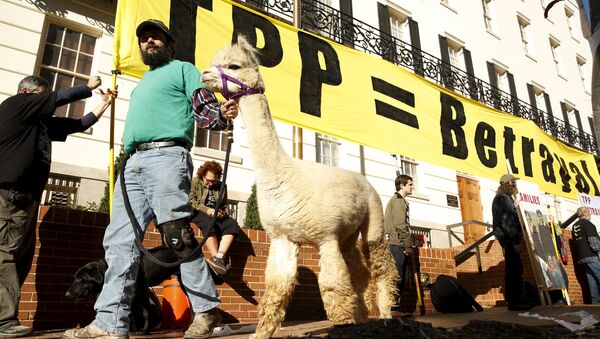MOSCOW (Sputnik) — On Thursday, 12 countries, comprising the United States, Australia, Brunei, Canada, Chile, Japan, Malaysia, Mexico, New Zealand, Peru, Singapore and Vietnam signed the TPP deal in the New Zealand capital of Auckland.
#Peru: thousands marched to protest against the #TPP @telesurenglish pic.twitter.com/Oj7a6RE8G3
— Rael Mora (@RaelTeleSUR) 5 февраля 2016
The deal between the 12 states, covering about 40 percent of the global economy, has been widely criticized for its unusually secretive negotiations and possible adverse effects.
Getting ready for protest of #TPP at @WhiteHouse. Join us to #stoptpp pic.twitter.com/UG9pMF8Tki
— Lacy MacAuley (@lacymacauley) 3 февраля 2016
Ahead of the signing ceremony in Auckland, activists from the Stop Fast Track movement, protesting against TPP's secrecy and the speedy approval of the agreement, gathered in the vicinity of the White House. They carried a huge banner reading "TPP = BETRAYAL" and many placards with anti-TPP slogans, such as "TPP will kill the internet," "TPP ends democracy" and "TPP pleases Wall Street."
According to the "Flush the TPP" initiative, Wednesday's rally was part of a series of protests that took place in some 40 US cities, including New York, Boston, Chicago, Detroit, St. Louis, Denver, San Francisco and Salt Lake City as well as in seven other countries, such as New Zealand, Chile and Peru.
#Tampa, FL: March to @marcorubio office to #StopTPP, leave special gift. https://t.co/GdxX9qX0Af @PDAction @AFLCIO pic.twitter.com/w95mN9rglJ
— Flush the TPP (@FlushtheTPP) 5 февраля 2016
Critics of the trade agreement say the deal will undermine standards and regulations on environmental protection, health and safety, as well as workers’ rights.
There has been considerable opposition to the TPP from international organizations and lawmakers, who have criticized the unusual secrecy in which the deal was negotiated and its apparent favoritism toward multinational corporations.


